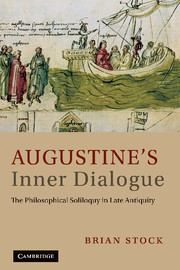Introduction
Published online by Cambridge University Press: 10 January 2011
Summary
The subject of this study is a literary and philosophical genre which is defined in the writings of Augustine of Hippo as the soliloquy (soliloquium). This is a type of rational dialogue (or dialogue with Reason) in which questions are asked and answers given within the mind of a single person. In the pages that follow I examine Augustine's use of soliloquies in the works known as his “dialogues,” as well as in the Confessiones, De Civitate Dei, and De Trinitate.
I am chiefly concerned with one use for soliloquies in these works. This is Augustine's development of a consistent philosophy of narrative between roughly 386 and 400 and the application of that philosophy to his conception of the self. The book's organization is intended to reflect this progressively developing concern with soliloquium, narratio historica, and personal identity. I begin in Chapter 1 with a review of the influences that shaped Augustine's conception of inner dialogue. Chapter 2 deals with an important example of this type of discourse in his early writings, namely his demonstration of the existence of the self. In Chapter 2 I also introduce the theme of the narrative self, toward which, I argue, he orients his reiterated uses of this demonstration in the years leading up to his conversion to the religious life. Chapter 3 discusses soliloquies and narratives in the dialogues devoted respectively to order and free will, namely De Ordine and De Libero Arbitrio.
- Type
- Chapter
- Information
- Augustine's Inner DialogueThe Philosophical Soliloquy in Late Antiquity, pp. 1 - 17Publisher: Cambridge University PressPrint publication year: 2010

